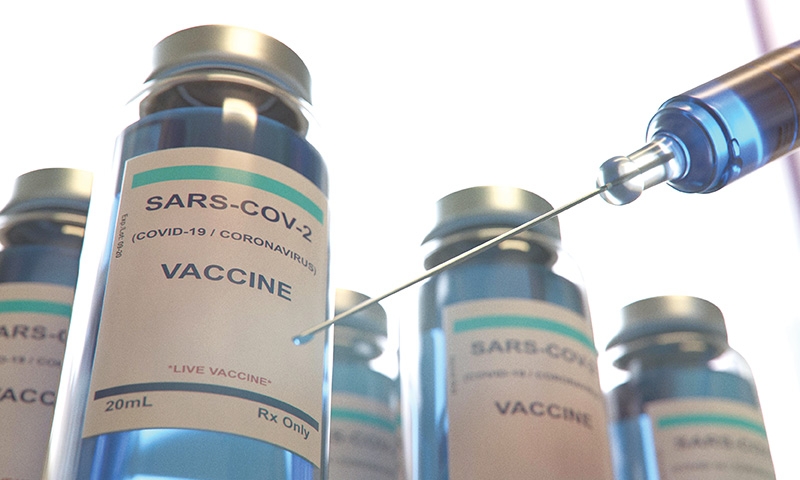EU vaccine pooling plans picked apart
 |
| Some pharma groups would consider joining patent pools if conditions were met, Photo: Freepik.com |
London-based GSK, the world’s sixth-largest pharmaceutical company in 2019 according to Forbes, is working with several companies and research groups globally to develop an answer to the pandemic. This is very different from the voluntary pooling of patents recently proposed by the EU in their draft resolution for the World Health Assembly as it can help GSK protect the patents.
Vi Nguyen, external affairs director of GSK’s representative office in Vietnam, told VIR, “Across all our collaborations for COVID-19 vaccines, GSK does not expect to profit from the pandemic. Any short-term profit we do generate would be put towards coronavirus-related research or long-term pandemic preparedness – either through GSK’s internal investments or with external partners.”
She gave no direct answer to whether GSK agrees with the EU’s proposal on voluntarily pooling patents. The corporation has one of the most diverse vaccine portfolios in the industry. In 2018, it sold 770 million doses of vaccine around the world. Some 70 per cent of its vaccines go to developing countries and it distributes some two million vaccine doses daily to over 150 nations.
Taking a similar tack, French pharma giant Sanofi said that its goal during this crisis is to provide effective therapies for COVID-19 and to make those treatments accessible to the people. David Tick, general manager of Sanofi Pasteur Indochina said that Sanofi believes that intellectual property management has not been an impediment in the global response to COVID-19. “Sanofi would consider, under specific conditions, joining an appropriate patent pool and engaging in the voluntary licensing of its intellectual property relevant to the COVID-19 pandemic and aimed at accelerating access to medicines,” Tick told VIR.
As one of the world’s largest research-based pharmaceutical companies, Pfizer Inc. is one of the biggest pharmaceutical firms that the EU targets to bring on board.
“Pfizer is open to exploring innovative approaches and partnerships that aim to facilitate the research and development (R&D) of new medicines and vaccines to address the coronavirus pandemic,” said John Paul Pullicino, chief representative of Pfizer (Thailand) Ltd.’s representative office in Vietnam.
Meanwhile, Hoffmann-la Roche Ltd., Ho Chi Minh City representative office was evasive when contacted by VIR, which somewhat reflects how difficult the EU may find it to get them to join. Evidently, vaccine R&D often take a long time and high costs. Vaccine producers often collaborate with partners to enhance their R&D capabilities, as well as manufacturing and distribution. Because of the huge profit, they want to protect and safeguard the patents of the pharmaceutical industry, which would give them exclusive rights to produce – and set the price – of any vaccine, treatment, and test that comes out of their labs.
Roche, GSK, Sanofi, Pfizer, and Johnson & Johnson (J&J) are all on the frontlines of COVID-19 vaccine research. Roche Holding AG became the latest company to win emergency US approval for a coronavirus antibody test and promised a fast scale-up of the tool that policymakers hope will help reopen the markets. The Swiss giant expected the production of the test to reach the high double-digit millions by June and pass the 100 million monthly threshold later this year. Meanwhile, global contract development and manufacturing organisation Vibalogics is to manufacture additional clinical trial materials for J&J’s lead COVID-19 vaccine candidate. J&J has been developing a vaccine for COVID-19 since January, selecting a lead candidate to take forward in March 2020. The first batches of a COVID-19 vaccine could potentially be available for the Emergency Use Authorization in early 2021.
This month non-governmental organisation Oxfam reported that the top 10 pharmaceutical companies earned $89 billion in profit last year – an average of just under $30 billion every four months, while the cost of procuring and delivering a safe and effective vaccine to the world’s poorest people (3.7 billion people) would be $25 billion. Roche, GSK, Pfizer, Sanofi, and J&J were named among the top 10 list in 2019.
What the stars mean:
★ Poor ★ ★ Promising ★★★ Good ★★★★ Very good ★★★★★ Exceptional
 Tag:
Tag:
Themes: COVID-19
- 67 million children missed out on vaccines because of Covid: UNICEF
- Vietnam records 305 COVID-19 cases on October 30
- 671 new COVID-19 cases recorded on October 1
- Vietnam logs additional 2,287 COVID-19 cases on Sept. 21
- People’s support decisive to vaccination coverage expansion: official
Related Contents
Latest News
More News
- State corporations poised to drive 2026 growth (February 03, 2026 | 13:58)
- Why high-tech talent will define Vietnam’s growth (February 02, 2026 | 10:47)
- FMCG resilience amid varying storms (February 02, 2026 | 10:00)
- Customs reforms strengthen business confidence, support trade growth (February 01, 2026 | 08:20)
- Vietnam and US to launch sixth trade negotiation round (January 30, 2026 | 15:19)
- Digital publishing emerges as key growth driver in Vietnam (January 30, 2026 | 10:59)
- EVN signs key contract for Tri An hydropower expansion (January 30, 2026 | 10:57)
- Vietnam to lead trade growth in ASEAN (January 29, 2026 | 15:08)
- Carlsberg Vietnam delivers Lunar New Year support in central region (January 28, 2026 | 17:19)
- TikTok penalised $35,000 in Vietnam for consumer protection violations (January 28, 2026 | 17:15)






















 Mobile Version
Mobile Version